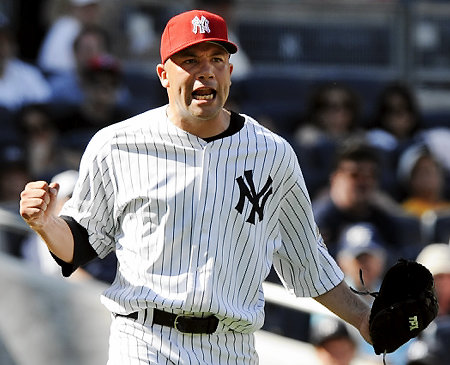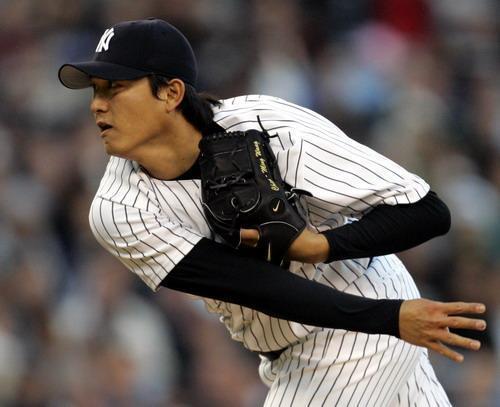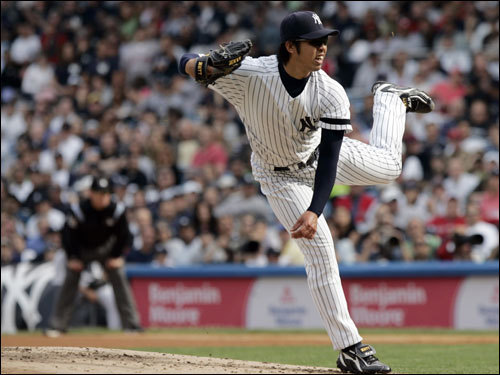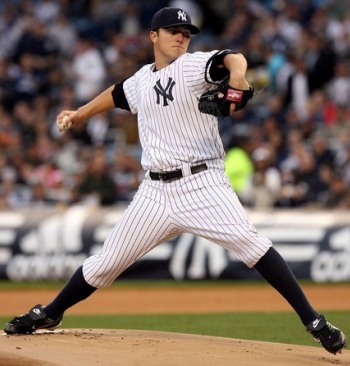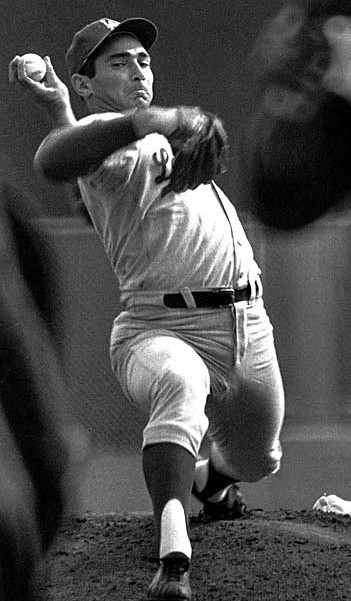Sean Smith at the Hardball Times has a lengthy article about Ichiro Suzuki's chances of being voted into Cooperstown and/or the Japanese baseball hall of fame and he does some interesting analysis and makes a few interesting points, though I have a few problems with his conclusions and his paths to them.
He looks at Ichiro's value overall, not just his hitting stats, and compares his Wins Above Replacement (WAR) to those of other mid-range current and probable future Hall of Famers as well as (for reasons he does not explain) to Tony Oliva. He finds that for the eight full seasons that Ichiro has played stateside, his WAR value is comparable to (among others) the likes of Duke Snider, Richie Ashburn, Sosa, Reggie, Vlad, Manny Ramirez, and Clemente, who are all between 40 and 55 WAR. Ichiro has about 45.
That's fine, and instructive even, as it suggests to us that Ichiro's skills as a baserunner and defender help to offset his almost complete lack of power. Smith admits that defense and baserunning are difficult to measure and acknowledges that there is some disagreement in the field about just how good Ichiro is in these areas (especially defense) but concludes aftr a brief survey that he's probably pretty darn good, and I generally concur.
The problems with this are twofold:
The first issue is that the baseball writers who get to vote for Hall of Famers wouldn't know a WAR if is walked right up to them on the street and sang Low Rider. In any given year, Ichiro may have been just as good as any number of Hall of Famers, but the writers don't know that, and most of them aren't going to bother to find out.
They look at batting average and hit totals and awards and what they remember from highlight reels and then they vote based on whatever their gut says they should vote. Here's hoping none of the writers eats some bad sushi the night he decides to fill out his ballot.
Of course this may be more of a help to Ichiro than a detriment. The BBWAA's affinity for shiny objects plays right into Ichiro's hands:
- He has a gaudy .333 career batting average, which trails only Ted Williams, Tony Gwynn and Albert Pujols for players since World War II.
- He's been an All-Star and won a Gold Glove every season he's been in the league.
- He's never hit below .300, had fewer than 200 hits, 100 runs, or 30 steals in a season.
- He's never missed more than five games in a season, and usually doesn't miss more than one or two.
- He's led the American League in intentional walks three times, which is ironic when you consider that when he does get a hit, over 80% of the time, it's just a single anyway.
- He's won two batting titles and may very well take home a third this year.
- He has led the league in hits six times (including this year) and holds the all-time MLB record for hits in a season.
- He's one of only two players in history to win the MVP and the Rookie of the Year awards in the same season.
The other, and more significant problem for Ichiro is that unlike Manny Ramirez and Dave Winfield and Duke and Ashburn and Reggie, those eight years constitute the whole of his major league career. Ichiro may have been just about as valuable from 2001-08 as Tony Gwynn was from 1984-91, but Gwynn had another 12 years in the majors and another 1,591 hits on top of what he did in those eight seasons, whereas Ichiro has only his charming smile.

So career longevity is a problem. Smith rightly mentions that Ichiro is still playing and showing little sign of slowing down, though that's always true right up until it's not. We we can easily see him playing five more years and collecting another 1,000 hits which would make him a shoe-in for Cooperstown, but everyone thought Dwight Gooden and Don Mattingly and Dale Murphy were sure-fire hall of famers when they were in their prime, too, and they never got there for one reason or another.
If Ichiro doesn't manage to keep playing, if he gets hurt in a year or two and finishes with something like 2,100 career hits and hardly any homers, suddenly he's a much less compelling Cooperstown candidate. And if he loses some of his speed as he ages and plays three or four more years as a .285 hitter with no power who gets caught stealing too often and can't run anything down in the outfield, well, then we've got a problem.
But Smith avoids that line of thinking almost entirely, and instead goes backwards, not forward, looking at Ichiro's career in Japan and trying to translate it to the U.S. major leagues. He figures that the baseball writers won't "punish" Ichiro for the fact that he was born in Japan, and plays the woulda-coulda-shoulda game to demonstrate that Ichiro would already be a first ballot hall of famer if he'd been born in Florida.
He concludes that Ichiro would have hit .338 over the course of seven seasons here, with similar power (or lack thereof) to what he has shown. This would add another 1,200+ hits to his total, bringing it up to almost 3,200 (and counting!), and all but end the debate about his merits as a hall of famer.
Smith's done the analysis looking at players moving each direction across the Pacific Ocean and presumably has very good reasons for using the numbers he does for those translations, but I think that simply cramming the numbers through a translation algorithm misses something of the human and historical element, and I'll explain why.
In 1994, Ichiro hit .385 for the Orix Blue Wave, with 41 doubles, 13 homers, 29 steals, and nearly as many walks as strikeouts. This, all at the age of 20. Smith has Ichiro hitting .363 for the Seattle mariners with six homers, using his standard translations. He even consoles us that we should not worry about him being so young, as the Mariners had given an everyday job as an outfielder to Ken Griffey Jr. when he was just 19, and to A-Rod a few years later when he was 20. Of course, he ignores the fact that the Mariners jerked Edgar Martinez around until he was 27, but we'll let that go.
Instead, we'll look at the rarity of the suggested accomplishment in itself. Anybody have any idea how rare it is for a 20-year old to hit .360 in the major leagues? Right. it's never happened. In fact, only two players in history age 20 or younger have even hit as much as .330 in a qualified major league season. Those are two very special cases, and neither was officially a rookie, as Ichiro would have been.
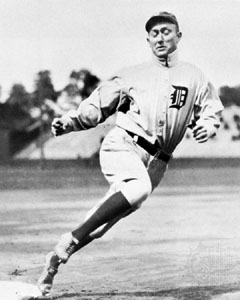
Ty Cobb hit .350 in 1907, but he already had a full season's worth of at-bats (over parts of two years) under his belt before that season started. Cobb was maybe the best hitter who ever lived, and the talent level he faced was not what it is now. The other was Alex Rodriguez in 1996, who had 65 games of major league experience before that campaign, also spanning parts of two seasons, and may have had some artificial help, like many in the major leagues did at the time. Anybody else who's come close to a batting average like that had a lot more seasoning in the majors than Ichiro would have in 1994, just two years after graduating high school.
The danger here is assuming that since the Japanese think of their leagues as "major" they must be, and that is clearly not the case. Players who are marginal or worse in the U.S. go to Japan and thrive. Alex Cora, Tuffy Rhodes, Greg Wells, Charlie Manuel - all bench players in the American major leagues who became stars in Japan.
Players who are superstars there, like Hideki Matsui, Kazuo Matsui, and Hideki Irabu, come here and find that they are merely good, if that. Some succeed for a while, though never as much as they did in Japan, and then flame out (like Hideo Nomo), or never really find a way to make it work here at all (like Kei Igawa). If Igawa is any kind of example, the Japanese majors must be somewhere around the level of AAA or maybe a bit lower. I'm not saying that Ichiro could not have done well in the US in his early 20's, I'm just saying that he would not have hit .363.
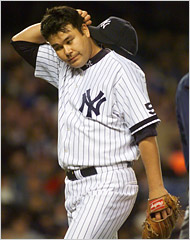
With that said, it's worth noting that the baseball writers have made exceptions in the past for players who, for reasons beyond their control, did not debut in the major leagues until later in life. The most obvious example lies in the Negro Leagues, in which black stars played until the late 1940's. Those players who got a shot at the majors late in life, even if they had only half a career or less at the major league level, were still taken seriously and given some credit for what they did do, and presumably, what they could have done, if given a chance.
Jackie Robinson, for example, did not debut in the majors until he was 27, and played only 10 seasons. He was elected anyway, based on a combination of his major league accomplishments and his Negro League experience, though the records on those are sketchy at best. Satchel Paige was elected almost entirely on his reputation in the Negro League, as were several others.
This example isn't wholly useful, however, because the Negro Leagues (for the most part) also took place in the United States, and so the voters could legitimately include the accomplishments of Robinson and Paige and Monte Irvin in the Negro Leagues as they evaluated the players' records for the National baseball Hall of Fame, per the voting rules.
Ichiro's previous accomplishments took place not just in a different league, but in a different nation, and therefore should not be considered when evaluating the player's merits for the National baseball Hall of Fame.

Sean Smith's article then goes on to address what the Japanese voters might do for their own hall of fame, and concludes that Ichiro has a pretty good shot there, too. I won't get into that because frankly, I don't much care. It's their hall of fame, they can do what they want with it.
You see, it is, in fact the National Baseball Hall of Fame and Museum, as in this nation, the United States, not Japan or the world, but the U.S. That's why Sadaharu Oh is not already in the Hall, and that's why the baseball writers will not (and technically cannot) give extra credit for Ichiro's exploits overseas.
But as I mentioned, they may nod need to do that anyway. If he keeps going at anything close to his current pace, he'll collect 3,000 hits sometime in his early 40's and nobody will have to wonder if the BBWAA will ever elect him. The only thing we'll have to wonder about then is whether he might have passed 4,256 if he'd been born here, and of course we'll never know that either.



